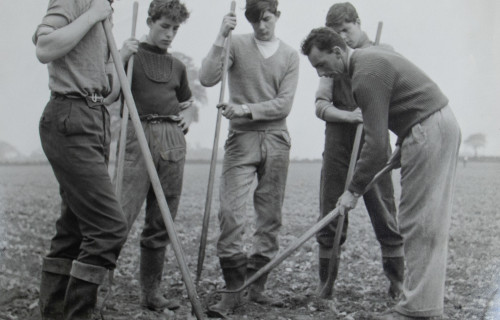Carpentry and Joinery Apprenticeship Level 2 Standard
-
2
Level
Level 2 -
Duration
2 years -
Start Date
April 2025 -
Venue
City College Norwich campus -
Course Code
E0207
What You Will Study
Carpenters and Joiners will work with wood-based materials to create and install components. This apprenticeship includes 2 different pathways and you will either work on a construction site as a Site Carpenter or in a workshop as an Architectural Joiner:
- Pathway 1: A Site Carpenter will prepare and install basic building components e.g. doors, straight staircases, wall and floor units, and will build structures on a building site or in domestic and commercial premises.
- Pathway 2: An Architectural Joiner will create components by setting out, marking out and manufacturing basic architectural products, including doors, windows, straight staircases and ironmongery.
Course content includes:
- Core duties, skills and competency units (both pathways)
- Core knowledge units (both pathways)
- All behaviours to be displayed by all skilled Carpentry and Joinery workers (both pathways)
You will complete the Level 2 Carpentry and Joinery Apprenticeship Standard.
- This apprenticeship will involve college attendance and off the job training.
- You will also develop your knowledge, skills and behaviours.
- You need to have an employer to support your apprenticeship and be employed in a relevant job role.
- The typical length of this apprenticeship course is 27 months, and the course runs at both City College Norwich and at our Easton campus.
If you already have an employer for your apprenticeship, or would like more information on how to find an apprenticeship, please click How To Apply at the top of this page. If you are an employer who is looking to recruit an apprentice or already have someone you would like to enrol onto the apprenticeship course, please contact our Apprenticeships Team on 01603 773365 or email Apprenticeships@ccn.ac.uk to discuss the next steps.
Did you know?
You can live on-site in our Student Accommodation, just a few minutes away from the classroom!
Why Choose Easton College?
State-of-the-art facilities
Learn in our state-of-the-art Construction Centre and workshops with the latest equipment.
Industry expert teachers
You will be taught by expert teachers with extensive experience in the trade.
Demand for jobs
The UK construction industry needs to recruit 43,000 new workers every year.
Entry Requirements
- GCSE Grade 2/E in Maths and English (Language or Literature) or Level 1 Functional Skills in Maths and English
In order to enrol onto an apprenticeship, you must be employed in a relevant job role and undertake a range of tasks which would enable you to complete the apprenticeship qualification.
How You Will Be Assessed
Training and assessments are delivered in the workplace and in college. Apprentices will be required to attend college-based sessions as part of their training, whilst also completing off-the-job training in the workplace. You will also complete assessments and observations in the workplace.
At the end of the apprenticeship you will complete an End Point Assessment (EPA) which will consist of:
- 1- hour multiple- choice knowledge test
- 7- hour practical assessment with questions
- 1- hour interview with an independent assessor underpinned by the portfolio of evidence
Course Progression
On completion of this standard, some apprentices may progress onto the Level 3 Advanced Carpentry and Joinery apprenticeship standard, or may secure employment as a Site Carpenter or Architectural Joiner. Alternatively, successful apprentices can also consider further study on higher level Site Management courses.
Where Your Course Can Take You
The achievement of this standard will meet the requirements of the Construction Skills Certification Scheme (CSCS) 'Skilled Worker' standard, which is widely accepted in the sector as a 'licence to operate' in a skilled construction trade. Successful apprentices may also pursue further development or promotion within the organisation or the wider sector.
Fees
Apprenticeship course fees are subject to the age of the apprentice, and the size of the company.
For employers who do not pay the apprenticeship levy and who take on an apprentice who is aged between 16-21 at the start of their apprenticeship, there will be no direct cost and the full training costs will be covered by Government funding. If the apprentice is aged 22+ the government partially subsidises the training costs and the employer will need to pay 5% of the total price. In the case of this course, the fee would be £650.
A levy paying company will pay the full cost of the apprenticeship from their levy account which in this case would be £13,000.
Please note that course fees are to be paid by the employer and apprentices must not be asked to make a financial contribution toward their training.
To discuss apprenticeship course fees in more detail or for more information on recruiting an apprentice, please contact 01603 773365 or Apprenticeships@ccn.ac.uk.
Why Choose Easton College?
State-of-the-art facilities
Learn in our state-of-the-art Construction Centre and workshops with the latest equipment.
Industry expert teachers
You will be taught by expert teachers with extensive experience in the trade.
Demand for jobs
The UK construction industry needs to recruit 43,000 new workers every year.
Similar Courses
Bricklayer Apprenticeship Level 2
Level 2, Apprenticeship,
Delivered at Easton College campus
Property Maintenance Operative Apprenticeship Level 2 Standard
Level 2, Apprenticeship,
Delivered at Easton College campus
Carpentry and Joinery Apprenticeship Level 3 Standard
Level 3, Apprenticeship,
Delivered at Easton College campus
Higher Apprenticeship - HNC Construction Management (Construction Design and Build Technician)
Level 4, Apprenticeship,
Delivered at City College Norwich campus
Latest News
A former agriculture student who studied at the then Norfolk School of Agriculture has shared his memories from when Easton College was in the first years of its existence.
Read more